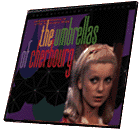

France musical
drama
1964
color 91 min.
Director: Jacques Demy
CLV: $49.95 - available
1 disc, catalog # CC1480L
There's nothing else exactly like 1964's The Umbrellas of Cherbourg in the whole history of movie musicals, and there's no other filmmaker who quite corresponds to its director, Jacques Demy. Like his compatriot, the French New Wave artist François Truffaut, Demy reached back to the glory days of French cinema and to Hollywood's big-studio era for inspiration; like Truffaut, he was audacious, experimental, and modernist. But where Truffaut's films show the legacy of Renoir, Demy's are closer in style to René Clair, whose early sound movies were improbable soufflés that mixed music and farce and contained undercurrents of feeling that welled up unexpectedly. And where Truffaut experimented with narrative, Demy, an old-fashioned romantic blessed with a Sixties pop sensibility, played with new ways of conveying emotion through color and music.
The Umbrellas of Cherbourg is a deceptively simple romance that begins sweetly, joyously, and ends bittersweetly. It's a tragedy of the commonplace, set between 1957 and 1963: nothing extraordinary happens, just the erosion of romantic faith by the intolerable weight of time and distance. Guy and Geneviève (Nino Castelnuovo and the enchanting Catherine Deneuve) are young lovers in the small seaport of Cherbourg who are separated when he goes off to fight in Algeria. The day before he leaves, Geneviève gives herself to Guy, and becomes pregnant. As his baby grows within her, the distance between them begins to seem immense and unbridgeable. Her pragmatic mother (Anne Vernon) urges her to marry the elegant diamond merchant (Marc Michel) who's rescued their nearly bankrupt umbrella shop; finally Geneviève succumbs to her arguments and allows him to rescue her, too. She and Guy end up living their lives apart, raising their children with other partners. In the finale, they meet one last time, as she's driving through Cherbourg, back to her home in Paris. She has her child in the back seat when, unknowingly, she rolls up to his gas station in the snow. When she asks him if he wants to meet his daughter, he shakes his head.
The meaning of the film is in the combination of Demy's unadorned lyrics, Michel Legrand's shimmering, studio-born pop melodies (two were released in American versions, as "I Will Wait for You" and "Watch What Happens"), and the lustrous, brightly colored imagery. In form, the film is an opera, without a single spoken word. Demy's point is to elevate the ordinary, not just show how love heightens the banal but to underscore the significance of our day-to-day lives. The music and the astonishing candied images (the opening is an aerial view of choreographed umbrellas in the ethereal musical-comedy rain of Cherbourg) place Guy and Geneviève on a continuum with all the other lovers in history; when their love comes apart, the fairy tale goes on around them, but they're alienated from it. During a carnival, pregnant Geneviève ducks through the revelers, seeking the shelter of her mother's shop; Guy barely notices the Christmas tree his wife, Madeleine (Ellen Farner) has decorated in the office of his gas station--it's for the benefit of their little boy.
Demy, photographer Jean Rabier, and production designer Bernard Évein planned a film of incomparable visual richness. But it ended up being released in Eastmancolor, which faded badly through the years.. Before he died in 1990, Demy began the supervision of a restored version, and his widow, Agnès Varda, oversaw its completion The restoration was crucial, since the emotional effect of the film is as dependent on color as it is on music. This is a film that, diverting, delighting, hardly seems to make an emotional dent; but when it's over, you're so devastated that you can hardly move.
-- Steve Vineberg
Steve Vineberg writes regularly on movies for the Boston Phoenix and the Three Penny Review, and teaches theater and film at the College of the Holy Cross




